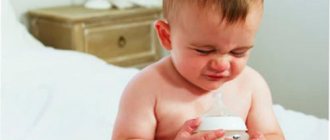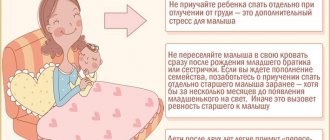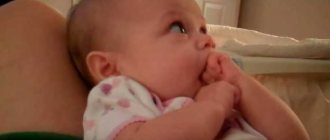If women who feed their children with milk are thinking about how to wean their baby from the breast, then mothers of artificial babies are looking for answers to the question of how to wean their child off the bottle. Habits associated with the sucking reflex are quite difficult to overcome.
However, weaning off the bottle at a certain point is still necessary, since artificial mixtures or cereals cannot satisfy the needs of a growing person for vitamins and other useful elements.
Good nutrition also includes eating “adult” food, drinking from a mug and using cutlery. But this is in the future, now it is necessary to speed up the separation of the baby from the bottle, and this, let’s say right away, is not the easiest process. But doable!
Natural and artificial feeding
Children who are breastfed from the first days of life practically do not become attached to a container with a pacifier. Before the introduction of complementary feeding, mother's milk is both food and drink for them, and the breast is the primary means of calming.
To prevent an infant from getting used to a bottle, you need to give him water or dill water for colic from a spoon, using a syringe without a needle or an infant sippy cup. Closer to 6 - 8 months, you can begin to get acquainted with the cup.
However, for various reasons (for example, a lack of breast milk, a serious illness of the mother or her departure), the child still has to be given a bottle with a substitute for a natural product. Also, using a container with a pacifier is important on the street or during long trips.
Thus, artificial babies are forced from birth to receive nutrition from a bottle. However, sucking itself in infancy is not limited solely to satiation. For children, this is also a special ritual associated with calming and relaxing before falling asleep.
Many children develop the habit of going to bed with a bottle. Naturally, in such a case it is quite difficult for them to get rid of a peculiar ritual, since this threatens to leave the formed zone of psychological comfort.
The difference between children who were on breastfeeding and IV
Breastfed (breastfed) babies are not attached to the bottle and nipple. A newborn baby, when attached to the breast, drinks foremilk, which is similar in consistency to water, and eats hindmilk, which is thicker. Only when the child needs to take medicine or drink in hot weather, does the mother give him water from a spoon, syringe or pipette. At six months, the baby grabs a cup and learns to take his first adult sips from it. Parents whose children grew up breastfed do not have problems weaning off pacifiers and bottles.
When a mother has to supplement her baby with an adapted formula, if there is not enough milk, or feeding him with expressed milk, it is not possible to get by with a spoon or pipette. We have to accustom the baby to a bottle so that he can eat properly. A bottle is a convenient device that can be used to easily give a child something to drink on the road or on a walk. He happily takes it in his hands and drinks it if he feels thirsty.
Children who have been on IV (artificial feeding) since birth perceive the bottle and pacifier as a means of satiation and calming. The baby gets used to falling asleep with a bottle, feeling relaxation and comfort, and it is extremely difficult to get rid of this habit.
Do I need to wean it off?
You can often hear the opinion that the child himself will decide when to give up the bottle.
Like, he will grow up, mature, and begin to be shy, for example, of his more independent peers. A sound idea, if not for one thing.
The desire to give up a container with a pacifier may arise in a child, for example, only at 3 or 5 years old. And what should parents do, wait for the right moment?
In adult children, sucking is no longer a reflex, but a habit, and it is quite convenient. Judge for yourself: you can drink water from a bottle at night without waking up. Why change anything?
Thus, if a grown-up child does not want to part with his “buddy” on his own, parents need to intervene in this process. Why is it worth weaning your baby off the bottle? There are several arguments:
- Sucking on a pacifier can cause malocclusion and affect tooth growth. It should be noted, however, that this opinion is not shared by all pediatricians and orthodontists.
- There is also an opinion that constantly having a pacifier in the mouth can lead to incorrect pronunciation of individual sounds. Naturally, this cannot but affect the development of speech as a whole.
- Children who fall asleep holding a bottle drink a lot of liquid, which affects the frequency of urination. This is why it becomes difficult to potty train a child and stop using diapers.
From the point of view of psychological science, the children's habit of drinking milk or other drinks from a bottle before falling asleep is harmful because it slows down the rate of psychophysical development. That is, children retain infantile skills that inhibit the formation of more adult skills.
In addition, not all mothers are psychologically resistant to sympathetic glances, gossip or direct accusations of parental incompetence from people who see a 3-4 year old child with a bottle. In addition, the baby himself will feel a kind of pressure, which may negatively affect his self-esteem in the future.
Why is it difficult for a child to live without a bottle?
Many parents, faced with the child’s stubborn reluctance to give up sucking, let the problem take its course, believing that the baby will sooner or later stop using the bottle. Why is it difficult to wean children off pacifiers and bottles? Child psychologists say that babies quickly form habits from an early age. And having received food from the nipple, they satisfy their night and daytime hunger, satisfying the sucking instinct. Breastfeeding babies enjoy the process of sucking, so without receiving breastfeeding, they happily suck on a pacifier or bottle nipple.
Prolonged sucking, according to doctors, inhibits further development and is fraught with falling behind peers.
The child may experience:
- bite problem;
- late development of speech - what to do if a child does not speak at 2 years old;
- problems with potty training - potty training.
When should you wean your baby off the bottle?
It is extremely difficult to name any exact age limits, since each child develops at his own individual pace, and becomes attached to the bottle in a special way.
That is why parents should monitor, first of all, the physical readiness of the baby to say goodbye to this infant attribute. It includes several parameters according to which the baby:
- sits without support;
- holds a spoon in his hand and understands why it is needed;
- uses it to scoop food from a plate and put it into the mouth;
- drinks from a cup or sippy cup;
- shows interest in adult food;
- has teeth and has the skill of chewing.
Typically these skills are fully developed by 12 months. The extinction of the sucking reflex should also be taken into account, since in the absence of this adaptive mechanism, the weaning process will go faster. Closer to 2 years, the physiological need to suck a bottle completely disappears.
There are situations when it is necessary to wean a baby off the bottle urgently, without waiting for physical and physiological readiness. For example, if you soon need to go on a trip, during which it will be impossible to sterilize the container and pacifier and dilute the mixture.
Is it normal for a child over one year old to sleep with a bottle?
Many parents see their children’s love for the bottle as a great difficulty that must be dealt with. However, a baby’s passion for a bottle is quite normal: many children continue to feed from the breast and have dinner from a bottle before bed after their first birthday. Some continue to feed from a bottle even after two years. It's not unusual for a toddler to show affection for a bottle. Even if he refuses to breastfeed, he may maintain the habit of sucking something.
Remember that feeding a baby from a bottle has an important psychological effect - thanks to sucking, the baby calms down. During early childhood, many children use pacifiers or thumb sucking, especially at bedtime, to help them fall asleep. For most babies, sucking is an important part of restful sleep. The presence of such a habit or an independent refusal to use a bottle has no connection with “progress” in development or “lag.”
Bad time for “experiments”
So, if the child does not want to give up the bottle, he will still have to be weaned. It is only important to follow certain rules in order to avoid stressful situations and not harm the child’s psyche. You should choose the right time for this.
It is best to begin weaning from a container with a pacifier at a time when a child’s life is stable and calm. Stop breaking the habit if:
- child is sick;
- he has a brother/sister;
- the family is on the verge of divorce or you and your spouse have recently separated;
- the baby is going through a period of adaptation to a nursery or kindergarten;
- At the same time, the baby is accustomed to the crib;
- planning to move to another place of residence.
During these emotional experiences, the bottle allows the baby to calm down. And refusal of such a “sedative” is fraught with an increase in the stressful situation.
It is believed that summer is the best period for weaning off the bottle. Perhaps this belief is due to the fact that in the autumn-winter period immunity decreases, and giving up the bottle and, accordingly, stress can provoke a deterioration in the body’s defense system.
If a child not only drinks from a bottle, but also sucks on a pacifier, the refusal of both devices should be consistent in order to reduce the likely inconvenience and the number of children's whims.
First of all, you need to remove the bottle and switch to eating from a plate and mug. At this time, the pacifier will be used only for falling asleep quickly, and after about 3-4 weeks, when the baby forgets about the bottle, you can get rid of the pacifier.
What not to do?
- Taking or hiding the bottle without explaining anything, simply deciding that the time has come.
- Wean during periods of emotional stress, for example, trips to the sea and during other emotional upheavals for the baby.
- It is not advisable to eradicate the habit in the summer. The thing is that summer is a hot season and at this time the child may require more liquid, so weaning from the bottle in the summer can cause stress in the baby.
- Give up halfway and give away your favorite item due to children's crying and hysterics. Sometimes, in order to achieve a goal, you have to endure for several days for your efforts to produce results, but under no circumstances should you give up.
Parents who decide to get rid of a child’s bad habit must go all the way, despite lack of sleep, hysterics and screams. Otherwise, he will understand that everything can be achieved with help and crying and thus will manipulate you.
How to wean yourself off the “daytime” bottle?
At first, try going without a bottle during the daytime. Be sure to purchase cutlery and light plastic dishes with bright patterns for your child. Kids really like images of characters from their favorite cartoons or fairy tales.
Offer your child to drink milk, water or juice from a mug or a special sippy cup (it all depends on age). The last device is a container with a sealed lid and two holders. There is a silicone spout at the top, which allows your baby to drink rather than suck, without getting wet.
In the store you can buy a sippy cup of any shape, color and size. These sippy cups are also suitable for going outside. You just need to choose a device with a protective cap that protects the spout from dirt and dust. If your child gets thirsty and there is no sippy cup nearby, give him a juice box with a straw.
If the baby is capricious and demands to drink in a bottle, you should switch his attention to new cups and plates and offer to repeat after his mother. Pour the milk into mugs or sippy cups and have breakfast together. Children love to imitate their parents and repeat certain actions after them.
A 2-year-old child can be invited to play a little by pouring juice into mugs and having a competition “Who can drink it faster.” Naturally, the adult needs to give in so that the baby emerges as a winner and experiences positive emotions from his winnings.
However, you should not get too carried away with gaming techniques. Tomorrow, lunch or dinner is not a game, but still a certain procedure, a ritual. Let your child get used to taking food seriously from childhood.
Sometimes mothers are a little tricky by pouring diluted or salted milk into a bottle, and tasty milk into a purchased mug. Children, having tried the contents of both containers, give preference to the one in which the tasty drink is poured.
Basic Rules
- Get the timing right
You should not start weaning during illness or any changes in the life of your child or family (moving, vacation, starting kindergarten). Don’t add stress to him and yourself if changes are coming in your life at this moment.
First, reduce your daytime feedings, leaving the bottle only for nighttime eating or drinking. After this, gradually remove night sucking.
If you decide to say goodbye to your beloved companion, then be patient and realize that this may not be an easy, but necessary stage. As soon as you give up and roll back this process, your smart baby will understand this, begin to manipulate you, and it will be much more difficult to wean him off.
Such children, who were transferred from the breast to its substitute, end up weaning even harder than those who are familiar with this subject from birth.
Just as in the case of weaning, a gradual method of achieving the goal is important in this matter. First of all, you should reduce the time the child “communicates” with the bottle. For example, you can start by stopping using it for walks. The next step will be to use a special sippy cup during lunch.
The most difficult time, most likely, will be the moment of going to bed, especially if the child is accustomed to the bottle and has always used it at such a crucial moment. It is equally important not to give in to the urge to follow the lead if the baby suddenly wakes up and demands a pacifier. You will have to find another way to calm the child.
In order not to injure his delicate psyche, you cannot wean him off abruptly and throw away the pacifier. In the days of our grandparents, they practiced smearing the pacifier with something bitter, such as mustard or horseradish. This method is also not equally suitable for all children.
Mom should try to explain to her child that drinking from a mug is healthier, more convenient and even tastier. By the way, a little trick often works here. If you pour milk diluted with water until tasteless or salted into a bottle, and, on the contrary, place a sweetened product in a cup, then the baby will easily be convinced that his mother is right.
Parents and other family members should set an example for the baby, that is, always use cups and glasses, and not drink from bottles in front of his eyes.
Perhaps, after the child is refused to satisfy his wishes, there will be hysterics and tears. It is important to hold and not give up your positions. And yet, in this one of the difficult moments, you should show maximum patience, attention and affection.
How to wean your child off the bottle at night?
During the day, babies actively explore the world, so they are ready for new emotions and experiments, including replacing a bottle with a mug or sippy cup. Another thing is the night period, because the pacifier becomes an important part of the ritual of falling asleep and gives the child a feeling of security and relaxation.
How to stop a small child from drinking at night if deprivation of a bottle leads to tears, tantrums and sleep disturbances? It is necessary to choose techniques that would allow the baby to calm down and relax without the usual pacifier and bottle.
For a one-year-old child, physical contact is very important, so the mother should sit next to the baby before falling asleep, hold the hand, stroke the tummy, etc. It is also worth changing your bedtime ritual by eliminating the bottle and introducing reading a fairy tale or singing a lullaby.
If the baby is already two years old, it is worth trying to come to an agreement with him. Explain in accessible language that adult children should not sleep with a bottle like newborn children. Just don’t shame the baby by calling him a doll, etc.
Soft toys can also help wean you off the bottle. Buy your child a new teddy bear that will be comfortable and pleasant to hug. You should also take more walks before bed, play active games during the day, and take relaxing baths in the evening.
Important information
In order to wean your child off his favorite bottle in a short time, you need to take into account the following rules:
- Children should not be allowed to use the attribute as a toy. Babies should associate the bottle only with eating. This will make it easier for parents to realize their idea.
- While feeding your baby, do not allow him to hold it on his own, then he will not get used to the inanimate object.
- Buy some fun games that require your participation. Try to devote as much time as possible to your children, engage them in various ways. For example, you can start sculpting figures together.
What can you expect?
Many mothers who weaned their child off the bottle had to deal with tears, whims, demands to return the container of milk or formula, and even hysterics. It is quite possible that everything will go smoothly for you, but you should be mentally prepared for some unpleasant situations.
Don't give up, even if you feel very sorry for the baby. Usually, after a few days, the child gets used to eating and drinking almost like an adult, and doesn’t even remember the bottle. If the parent returns the bottle at the first cry, the baby will understand that tears and hysterics are a sure way to achieve what they want.
However, it is worth distinguishing manipulative behavior from real problems. If a child begins to refuse food and cries all the time, you should show him to the doctor. Perhaps he was just sick. In this case, you can return the bottle for a few weeks, and then begin the weaning process again.
Parents will also be required to use their imagination. Even the most capricious baby can voluntarily refuse the bottle if this event is presented correctly. For example, offer to give a container with a pacifier to a familiar cat or dog that is feeding its offspring. It really works!
The question of how to wean a child from his favorite bottle needs to be decided individually. For some, buying a sippy cup helps, for others, buying a teddy bear helps. Some people wean themselves off the bottle at one year old, while others constantly carry it around with them even at two years old. That is why it is important to focus only on your child and seize the right moment.
Practical techniques
In order for weaning to be successful, you don’t need to do it at once, because it will be a lot of stress for the little man. It is best to use the following techniques and secrets:
- Take things gradually. First, you need to give up the bottle during the day. To do this, you can buy your baby a new beautiful cup and get the child interested in it. We will write below about how to wean your child off the bottle at night.
- Use little tricks. You can dilute milk in a bottle with water, so it will not be filling or tasty. At the same time, pour the milk in its pure form into a cup and let the child try it; most likely, the baby will prefer the tasty milk in the cup.
- Choose the optimal period. To make weaning less painful, it should be planned when there is no emotional stress on the child.
- Make up a fairy tale. Example: there lived a little boy Vanya and his best friend was a bottle, he played with it, fell asleep and ate, but Vanya grew up, and the bottle needs to go play with other little children, and Vanya will have a new friend: a beautiful cup with a red car .
- Offer to share. You can persuade him to give a bottle to a little neighbor or another infant, saying that he needs it much more, because he is still small.
- My own example. When sitting down to dinner together, parents can show by example how to drink from a cup, while saying that everyone should drink from a cup.
Precautions when using the bottle
You can continue to use your toddler's night bottle, but remember the prohibitions. When putting your baby in the crib, do not pour sugary drinks - juice and milk - into the bottle. If he regularly drinks sweet juice before bed, this can have disastrous consequences for his teeth. He will also be confident that he can continue drinking at night when he wakes up.
However, you can offer your little one a bottle of milk while he sits on your lap. This can become a habitual part of the evening ritual and preparation for bed. The main thing is to brush your teeth after feeding, and only then send your little one to bed.











